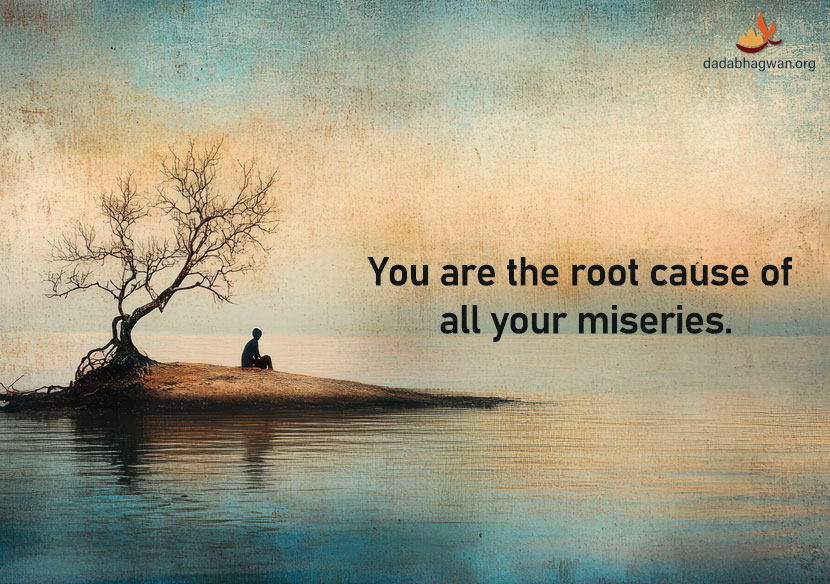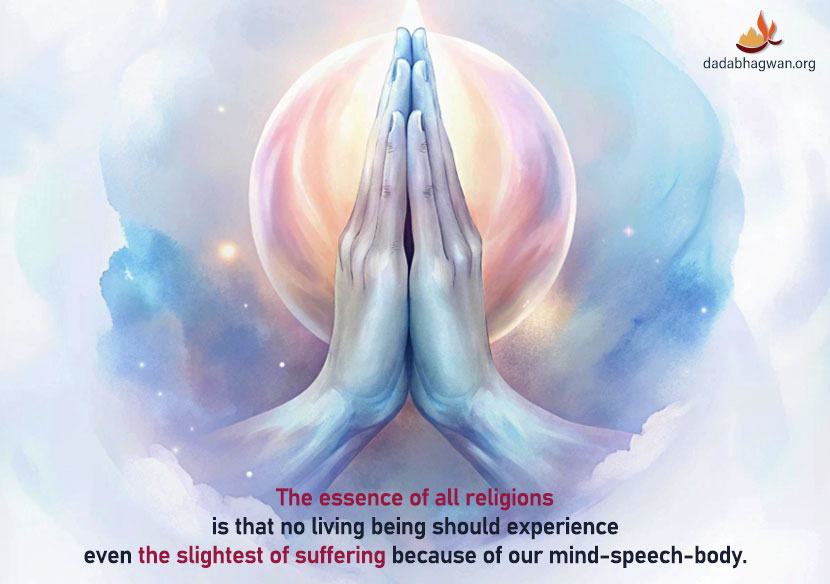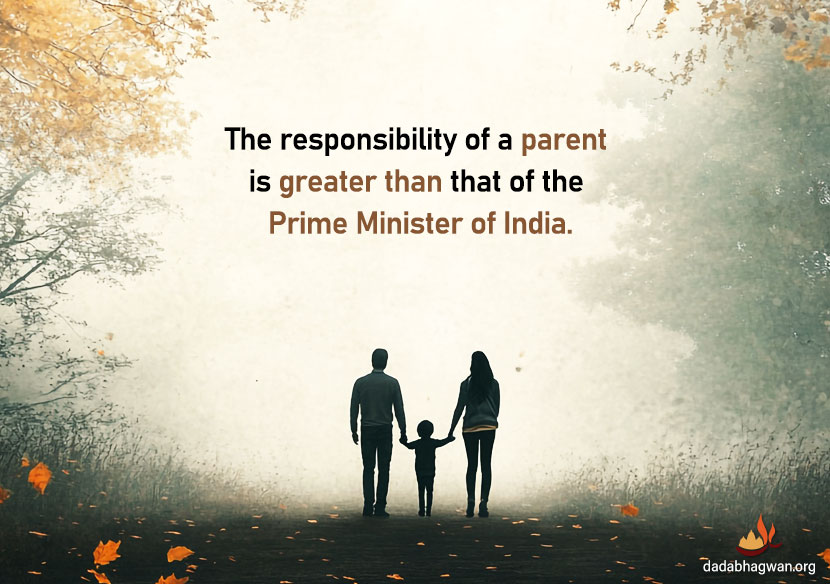In worldly life, we often say, “You reap what you sow!” If you harm others, you will end up harming yourself. But we don’t truly understand how to prevent that harm from occurring. We know we should serve our parents, do good for others, and that doing so leads to happiness – but we lack the practical method to make it happen. As a result, it is like being given the answer in math without being shown how to solve the problem, that is the situation people are in today.
Imagine a machine is malfunctioning and making noise. We might start hitting it and say, “It’s useless. These people sell cheap machines and just loot our money.” Now this increases the problem. Instead, we must examine in detail, where is the machine stuck? Which part is broken? When we replace the faulty part or lubricate the noisy section, the machine starts working smoothly again. This is a practical skill.
The same kind of practical skill one should know while having interactions with other human beings as well. To resolve problems in various types of relationships, different skills are needed; only then one can avoid conflicts in life.
The goal of human life
If we set out rowing the boat of life without deciding which destination we want to reach or knowing the direction, how will we ever achieve our goal? We may keep paddling and burn out, even lose hope, and at the end, drown midstream.

We must think about what should be the purpose of our life? We are born, we then grow up, study and get educated, take up a job or run a business, get married, have children, get them married, grow old and in the end, we pass away. While we are busy passing life, we ourselves pass away. At the time of leaving the body, nothing comes along with us. Not the house, bungalow, car, money, or even our family. Even our name is left behind right here. What comes along? Our own entanglements, our own attachments and abhorrence.
From the human life-form, one can bind karmas that lead to any of the four life-forms. But one can also become free from wandering in these four life-forms and attain moksha (liberation) and that too is only possible through a human body.
If we live for the happiness of others, we may take birth as humans again or go to the celestial realm. And if we attain awareness of our own true Self, liberation is possible, such is the potential of human life. Just like if we buy an engine and run it, but if we don’t connect it to a belt or any kind of machinery to draw water or grind grain, it stays useless. Similarly, if we spend our entire life running around without ever deciding on a true purpose, then our life goes to waste.
Cause of Conflict
In this difficult era, people have become so engulfed in miseries that they can hardly bear them. As a result, many experience mental issues, fall into depression, or sink into despair. Financial problems, health issues, challenges in raising children, conflicts between husband and wife, arguments between mother-in-law and daughter-in-law—all these seem endless. The main cause of such a life full of conflicts, is lack of understanding! Param Pujya Dadashri says that, “You are the root cause of all your miseries.” The initial root cause is ignorance. On top of that, misunderstandings in day-to-day dealings create small or big clashes, and we end up feeling miserable. Just as a burning coal cannot help but burn others, a person filled with inner suffering cannot help but cause pain to others around them.

Due to excessive emotional attachment and possessiveness of parents toward their children, and the inability to understand each other’s needs, bickering between the two keeps going on. The closest relationship in a household is that of spouses, despite being built on deep emotional connection, most conflicts arise between them. Not only that, clashes are also common amongst extended families such as, mother-in-law and daughter-in-law, sisters-in-law, brothers and sisters, and so on. Even in the workplace, there is conflict between boss and subordinate, between business partners, coworkers, or vendors. In fact, even after leaving behind the worldly life and living as a renunciate, dealings still remain between the guru and disciple, among fellow peers, and with the head of the religious community. This shows that in every area of life, we must learn to resolve conflicts.
Essence of all religions
The essence of all religions is that no living being should experience even the slightest of suffering because of our mind-speech-body. In our household, we should not cause suffering to anyone through conflict. At work or in business, we should not hurt anyone through dishonesty or unethical practices. As a boss, we should not hurt those who work under us and as an employee, we should do our work sincerely so that our superiors do not have to feel the need to scold us. As husband-wife, we should not hurt one another. As parents, we should pass on values to our children without suppressing them, as children, we should be in service of our parents heartily. In short, any action that causes pain to others is considered adharma (unrighteousness). Merely visiting temples or performing rituals is not a true religion, living a life with conflict resolution skills and not causing suffering to anyone is called a true religion.

Therefore, every morning, we should heartily pray five times, “May no living being in this world be hurt, even to the slightest extent, through this mind-speech-body.” And if by mistake if someone is hurt, we should deeply repent and cleanse that mistake by asking for forgiveness, which will lead us to a truly peaceful life.
Based on scriptures or spiritual discourses, when one begins to understand that the person insulting me, hurting me, or causing physical pain is simply the result of my own karmic account, when this understanding fixates into their worldview, then one can settle those karmas with equanimity, and as a result, both external and internal conflicts can be avoided.
In the end, ideal conduct will be essential!
Ideal conduct means no living being is hurt even the slightest through us. Whether at home, outside, or among neighbors, if no one is hurt through our actions, that is called ideal behavior. Still if someone is hurt because of us, we should immediately ask for forgiveness in our mind and make a firm resolution to not hurt anyone.
Ideal conduct should be practiced from the very beginning of life. It includes showing respect and humility to elders. If we neglect our elderly parents at home while being busy with grand religious activities at temples outside that is not an ideal conduct. The one who truly behaves ideally spreads a kind of fragrance all around them.
Conflict resolution between parents and children
Param Pujya Dadashri says that, “The responsibility of a parent is greater than that of the Prime Minister of India” Nowadays, in order to get a job we need to present a certificate to show that we are a graduate, but before getting married or before giving bringing a child into this world, we are not asked to present any certificate. Children receive the sanskar (values & morals) at home from their parents. Hence, it is important for parents to have an understanding of when and how much to say to their children, when to encourage them and when to discourage them. Still, we can gain such understanding from Param Pujya Dada Bhagwan, which can help us become certified mothers and fathers.

Parents repeatedly scold their children using negative words throughout the day in an attempt to correct them, which creates a negative impact on their children’s mind. Children may become depressed or rebellious. Instead, parents should talk to their children like friends, and handle them with care just like we handle glassware. Just like a gardener nurtures its rose plants by providing it with nutrients, protecting it, and removing its thorns, similarly, parents should nurture the positive qualities of their children’s behaviour and deal with them after understanding their personality. If a child does something good, parents should not feel overly attached, and if the child does something wrong, parents should not have any hatred, such should be the parental love. One eye should show love and the other eye should reflect firmness. Children should feel that they are scolding me for the mistake I made, but in every other way, they love me deeply. Excessive pampering is not good, but one should also not be too detached. There should be a balance between the two. Never raise a hand when children make a mistake. A child might look fine on the outside after a beating, but internally, they are broken. Advise them only when absolutely necessary. Before trying to correct their children, parents should first work on improving themselves. The character, thoughts, and values of the parents should be so elevated that they naturally influence the children. In the end, children are won over with love. If a child is going down the wrong path but is receiving unconditional love from their parents, then just one heartfelt comment from the parents like, “This does not suit our family,” will make them stop their behavior the very next day.
For deeper insights on how to interact with children in different situations, read: Positive Parenting: Parent-child relationship.
Conflict resolution between husband and wife
A husband and wife get married with an intent to bring happiness to one another for a lifetime. Yet, if we look closely, knowingly or unknowingly, both end up hurting each other in married life. Especially in this Kaliyug, the negative influence is such that even without reason, differences of opinion, suspicion, accusations, betrayal, and deception arise between spouses, causing them to hurt each other. Especially, the insistence on one’s own viewpoint and the desire to prove oneself right while declaring the other wrong is the beginning of differences in opinions which on increasing and leads to munbhed (Divisiveness due to a difference of thoughts). If the matter worsens further, it reaches the point of separation.
Actually, husband-wife should live as complements to each other. Rather than clinging to one’s own opinion, one should adjust according to what pleases the other. When husband-wife live as friends, married life becomes beautiful. In friendship, there is no extreme attachment or hatred because there is no intense expectation, infatuation, or possessiveness. Just like two friends living together, helping each other, and harmoniously supporting one another. But due to not being able to adjust with one another, having possessiveness over each other or when there is an effort to change the other person for the better, constant friction arises. Trying to correct the other person triggers a reaction from them, and that increases the arguments.

Moreover, after having children, if the husband and wife quarrel in their presence, it has a harmful effect on the children’s minds. Param Pujya Dadashri says that, “Where there is the slightest of conflict, there is no religion.” A home without conflict is as beautiful as heaven. But people have the wrong belief that, “Where there are utensils, they will make noise!” We must understand that human beings are not lifeless utensils. When either one is hurt, it sends waves of pain back and forth.
Husband-wife should live their life in a way that they are truly helpful to each other. If one faces difficulty, the other should do everything to ease their pain. In addition to this, since the wife is traditionally considered to be dependent on the husband, one should never cause sorrow to someone who is dependent on them, and should certainly never raise a hand against them. If one partner is tearing the relationship apart, the other should try to hold it together. Both should develop their conflict resolution skills to observe and understand each other’s nature and behave accordingly. The relationship should be so loving and graceful that both feel how fortunate I am to have such a life partner, where else would I ever find someone like this?
If there is true love between husband and wife, it would not rise or fall with any kind of changing circumstances. But today, even a short separation of a few months can lead to one being attracted to someone else. How can that be called love? In love, there is devotion. If the husband is far away, the wife should still constantly think of him, and if the wife is away, the husband should remember her throughout the day, that is what is called true marital bonding.
For a deeper understanding of how to create a happy married life, read Live a Happy Married Life.
Conflict resolution between superiors and subordinates
Whether in a job or business, if the interaction between a superior and a subordinate is free of conflict, then everyone around will find joy in their work. If, as a superior, we behave without arrogance and take good care of those working under us in every way, and if, as a subordinate, we remain humble, doing our work with full dedication and precision, then our interactions shine with harmony. In order to achieve this, we must develop conflict resolution skills.

Oftentimes at workplaces, superiors tend to dominate their subordinates, yet speak sweetly with their own bosses. Employees frequently complain that their superiors overload them with work, don’t pay them enough, and on top of that, act bossy and harsh. The whole world at large tends to disregard or devalue subordinates. Param Pujya Dadashri says that we must protect and care for anyone working under us, whether they are domestic workers at home or staff in an office. Suppose a servant is carrying a tray of tea cups and accidentally drops it. Then the employer angrily shouts, “Are your hands broken? Can’t you see?” The servant didn’t intend to break the cups, yet he is insulted publicly and may even be fired for a minor mistake. This hurts his ego. He feels, “Just because I’m poor the boss is shouting at me like this.” He too harbours enmity in his mind, which will surely be settled either in this very life or in another birth. Instead of getting angry, the boss must respond with compassion by asking, “You aren’t burnt, are you?”, and then gently say, “Please don’t rush next time.” With this the worker’s feelings will not be hurt and they will not hold any grudges.
We should understand that we are a boss only because we have people working under us. If they all leave, who will be the boss, and who will be the subordinate? It’s because of them that the business is working. Therefore, we should treat them not like servants but care for them like members of our own family. When we behave with such respect, even workers will regard their employer with familial reverence. But if we act like dictators by threatening to fire someone for every small mistake, they will lose respect for us in return.
As bosses or team leaders, our team members often work hard to complete projects. When a job is done well, the credit should be shared with the entire team but if a task fails, the leader should take full responsibility rather than blaming the subordinates. Unfortunately, in many cases, superiors take the credit when things go well and pass the blame when things go wrong, which shatters the motivation of the team.
In departmental or team settings, every team member should be given equal opportunity. We may express our opinions, but should not force them upon others. Instead, we should let everyone speak and listen to their perspectives as well. Often, our mental processing speed is faster than others’. We may quickly grasp a situation and decide, while someone else may take longer. At such times, we tend to become impatient and get irritated. At such times, the more understanding person should lower themselves to the level of the less understanding person and speak accordingly by checking in often with questions like, are you understanding? Just as we speak to a small child by coming down to their level, in the same way, we must exercise patience. Just as when a high-revolution machine is connected by a belt to a low-revolution machine, the mismatch in their speeds causes the belt to break, similarly, human relationships can break if we don’t match pace and understanding. That is why we must observe the other person’s nature carefully and adjust accordingly. That is the real technique of conflict resolution.
If we hold power, we must never misuse it to crush others. People in power sometimes behave in a way that ensures those who revolt against them can never rise again. But Param Pujya Dadashri says that " The one who abuses his power will lose it. He will also lose his right to be born as a human being again. If you reprimand a person for just one hour, you will bind one whole lifetime.” Just as when one seed is sown in a field and a thousand grains grow from it, if we use our authority to hurt a person once, that hurt returns to us many times over.





